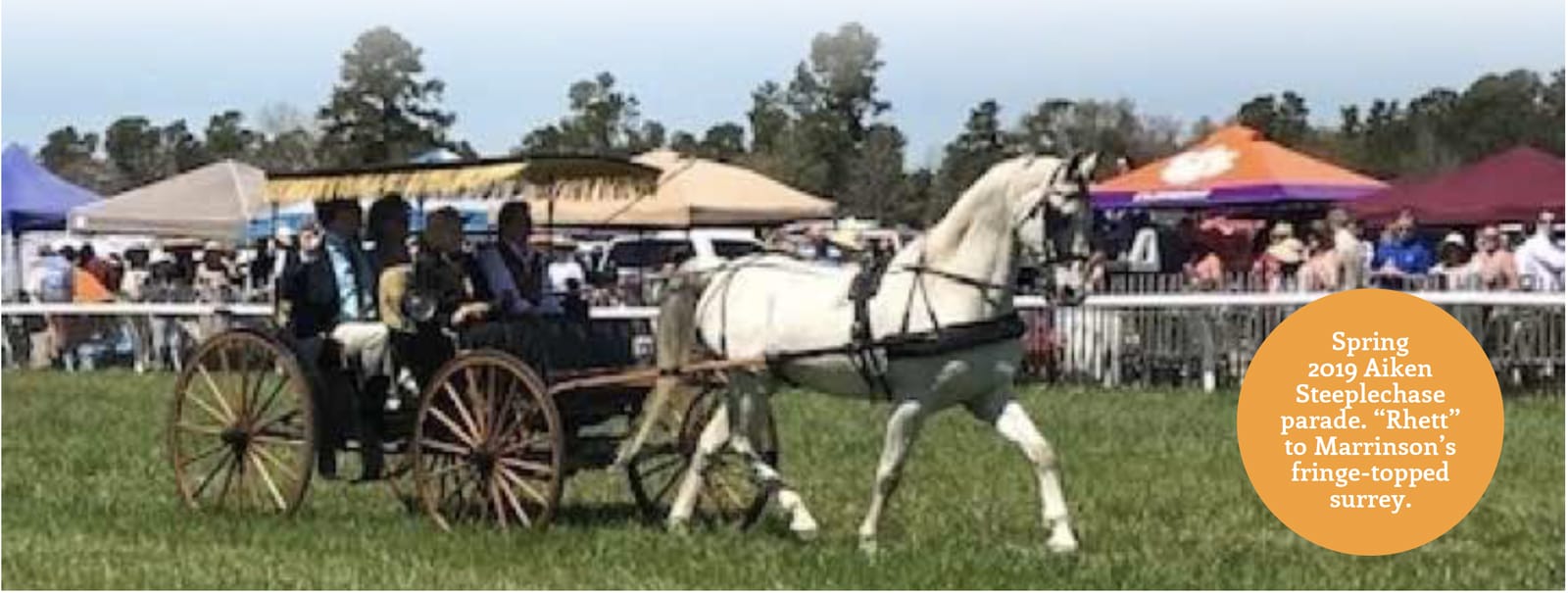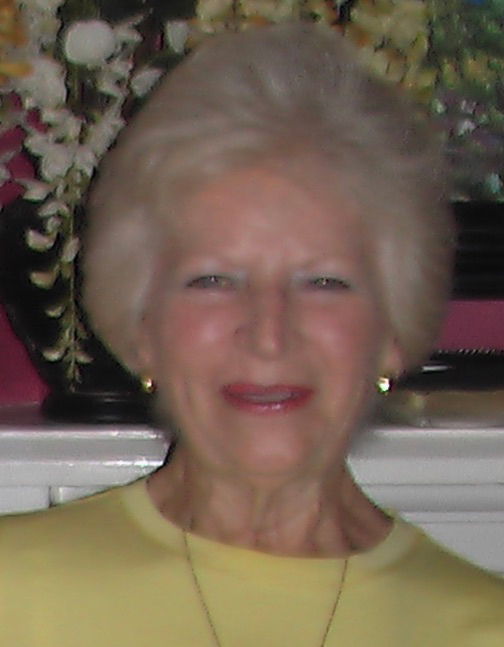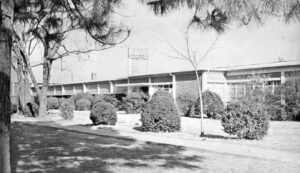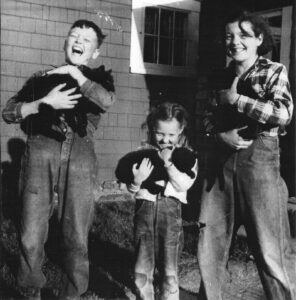Hang it all up when you’re no longer having fun, but delay that day as long as possible
Now that I’m in Aiken, which I fondly refer to as “Horse Central,” I’m never going to move away as long as my horse lives. I’m planning on at least another twenty years, or whatever number of years God grants me and “Rhett” good health and happiness together. Every imaginable equestrian discipline has followers in Aiken, except maybe rodeo events and troika races. There are likely as many dressage trainers as Baptist churches in Aiken County, and I imagine that carriage driving is probably the least popular of the many equestrian disciplines found in Aiken. Nevertheless, it’s my favorite and I recommend it to all who are horse-bitten, a condition for which there is no cure but many avenues of satisfaction.
Driving Tradition Into the Future
The motto of the Aiken Driving Club suits me perfectly. In early 20th century Virginia it was common to see horses in use, pulling ice or produce wagons and being ridden by the elite. My mother drove a pony, and related that one of her suitors courted her by horseback. Her sister had a five-gaited horse, whose mare was hitched and driven to a box buggy that my genius grandfather had made. The tradition I inherited definitely included horses and carriages. After the Great Depression, though, fewer persons could afford the luxury of a horse. When I appealed to my parents for a horse, the answer would invariably be, “If wishes were horses, beggars would ride.” Thus I put it out of my mind until I was self-supporting, 30 years old, and also married to a horse-savvy gentleman, the late Al Corbett, who encouraged me to follow my lifelong dream.
Yes! I had not only the means, but also the permission I imagined I needed, permission to accept what is surely one of the greater blessings that God may grant. First timidly leasing then purchasing a QH/TB cross, a lovely dappled gray gelding, I showed “Beau” in English Pleasure, winning every pleasure class in which there was no American Saddlebred, and cross-trained him over fences.
When “Beau” was tragically killed in a trailering accident, my husband bought me “King,” a royally bred American Saddlebred grandson of four time World Grand Champion, the immortal “Wing Commander.” The ASB breed-specific competition was heightened, but “King” won or tied high in both open and amateur five-gaited classes from Virginia through the Carolinas, Georgia, and Alabama. When retired, only because there were no Saddlebred shows anywhere near my then home on Hilton Head Island, on a lark I found an antique doctor’s buggy and, relying on the custom of Saddlebred trainers to start youngsters in harness before ever being saddled, I ordered harness, figured out from photos how to hitch, and started driving. Al Corbett having passed away, I married a guy I met on the Island and we gave ourselves a horse and buggy wedding, probably the last one on Hilton Head Island. Pity, I do love horse and buggy weddings, mine or anybody else’s. Broke my heart when “King” died of sand colic at the age of 19. On October 4, 1989, the same day the great Thoroughbred “Secretariat” died. I’m certain these two great champions became fast buddies in that big pasture in the sky.
Driving Ambition
Now horseless and needing to attend to my mother in a nursing home, I moved to Knoxville, Tennessee, but always felt I’d end up some day in Aiken, South Carolina, hopefully with another Saddlebred as grand, willing, and multi-disciplined as “King” had been, so I joined the Aiken Driving Club in 2007 as an out-of-town member.
In 2010 I acquired another Saddlebred, the only dappled gray listed in Tattersall’s sale catalog — bought him straight off the trainer’s van as it passed through Knoxville. When the Aiken Driving Club newsletter arrived containing an ad by ADC member Jerry Hagaman for a cottage in Johnston urging, “Come Live With Your Horse!” I took him up on it, moved all my stuff and the newly acquired “Rhett” in Jerry’s six-horse trailer from Knoxville to his Carriage Run Farm in Johnston, South Carolina. Through the mountains in the dead of winter, I followed close behind, towing the buggy on a utility trailer. Jerry is a serious carriage driver who encouraged me to drive more. How could I resist trying it? I already had the buggy, and Rhett, being a Saddlebred, was already trained to drive. In a perfect world, all horses would be trained in harness before being saddled. Then they would always have a second discipline, one that is easier on both the horse and the rider with ever increasing age.
On April 26 Rhett will be all of 18 years old, and I’m already 82; added together our ages total 100 years. That means eligibility for the Century Award in a dressage show! I do need to brush up on my riding form, though, as “Rhett” and I have preferred driving to riding for most of the ten years we’ve been a pair. I’m working on it now, or at least I will as soon as I can get my left foot out of a cast so it will fit into a stirrup again. Cracked my ankle on January 15, and before you ask, no, it wasn’t a horse-related accident; I fell on slippery back steps from my deck. But nothing keeps me from driving, as long as I can enter the cart — another advantage of carriage driving over riding.
There is nothing in carriage driving comparable to the Century Award of dressage, probably because it’s not at all unusual for riders from all other equestrian disciplines to change over to carriage driving as they get older and realize they don’t bounce like they used to. An age combination of 100 years or more is surely praiseworthy but not all that remarkable. Carriage driving is also, oh, so traditional and courtly as well as being quite sociable, as any pleasure vehicle will accommodate at least one passenger. I must have asked a hundred people to come drive with me, and when they take me up on it, they are always thrilled! We certainly don’t need a Century Award for carriage driving in Aiken, or any additional incentive to drive for our own pleasure or for the pleasure of spectators; we have something else just as good or maybe even better — we have carriage parades from time to time in the horse district, and always after the first race of the spring Aiken Steeplechase! No ribbons, but lots of cheers; it does the heart good.
Since I’m retired from work and have no family in this state, the Aiken Driving Club and all things horse have become the center of my life here in Aiken County. The Club is probably still the largest driving club in America, with today’s membership numbering 212. Besides the cohesive effect of the monthly newsletter, Club members host barbecues throughout the summer, and with cooler weather the rest of the year, the Club sponsors all manner of driving events, shows, competitions, clinics, lectures, and of course, parades and socials. Every member is encouraged to volunteer as often as possible for the additional benefit of learning how each phase of any driving event is carried out by the organizers and performed by the entrants. Sadly, we lost a major venue in 2019 with the passing of Katrina Becker of Katydid Farm in Windsor; the Katydid CDE was our one internationally recognized driving event. But other venues are still here and new ones are popping up. Once bitten by the horse fever there is no cure, but pursuing its satisfaction is a worthy lifelong passion.







